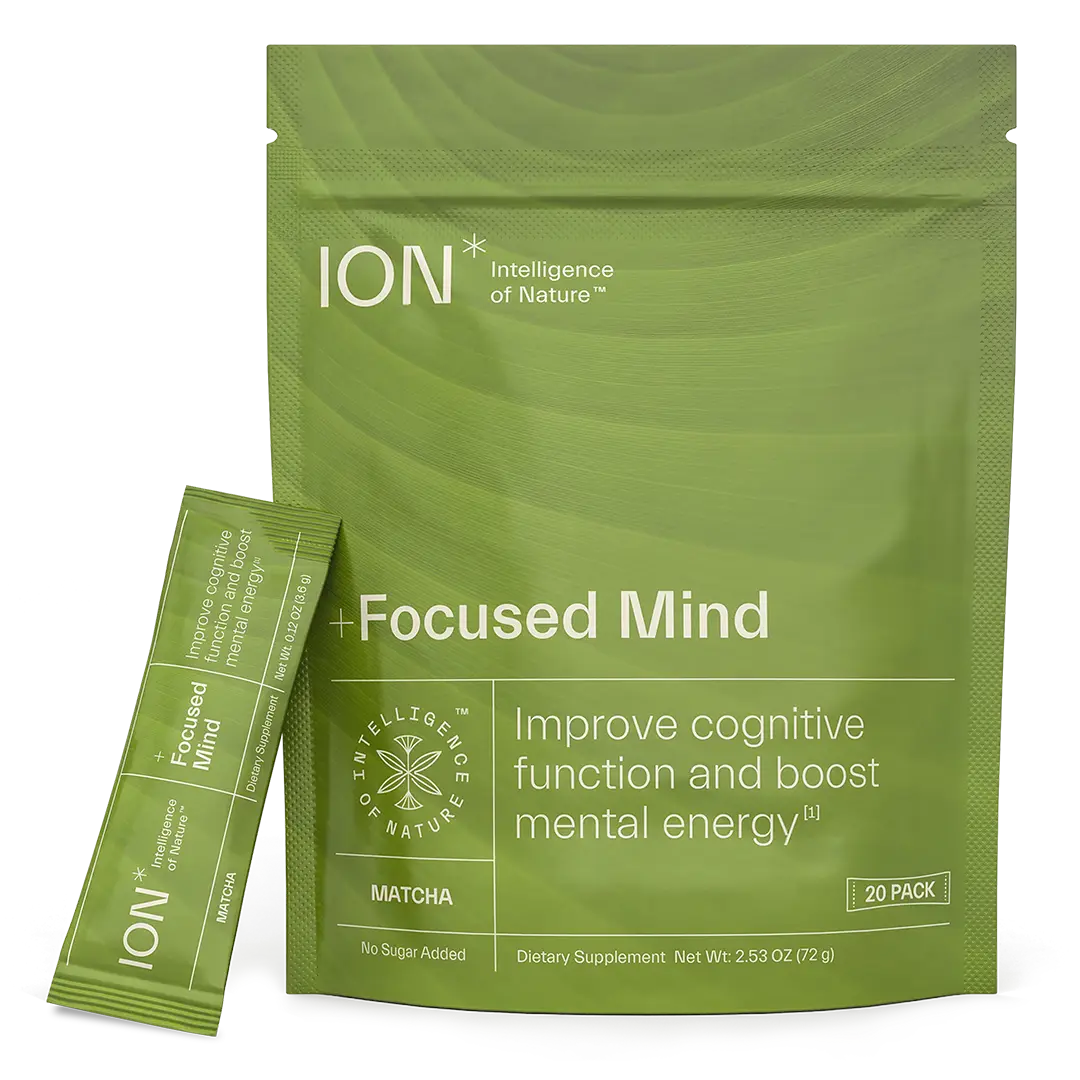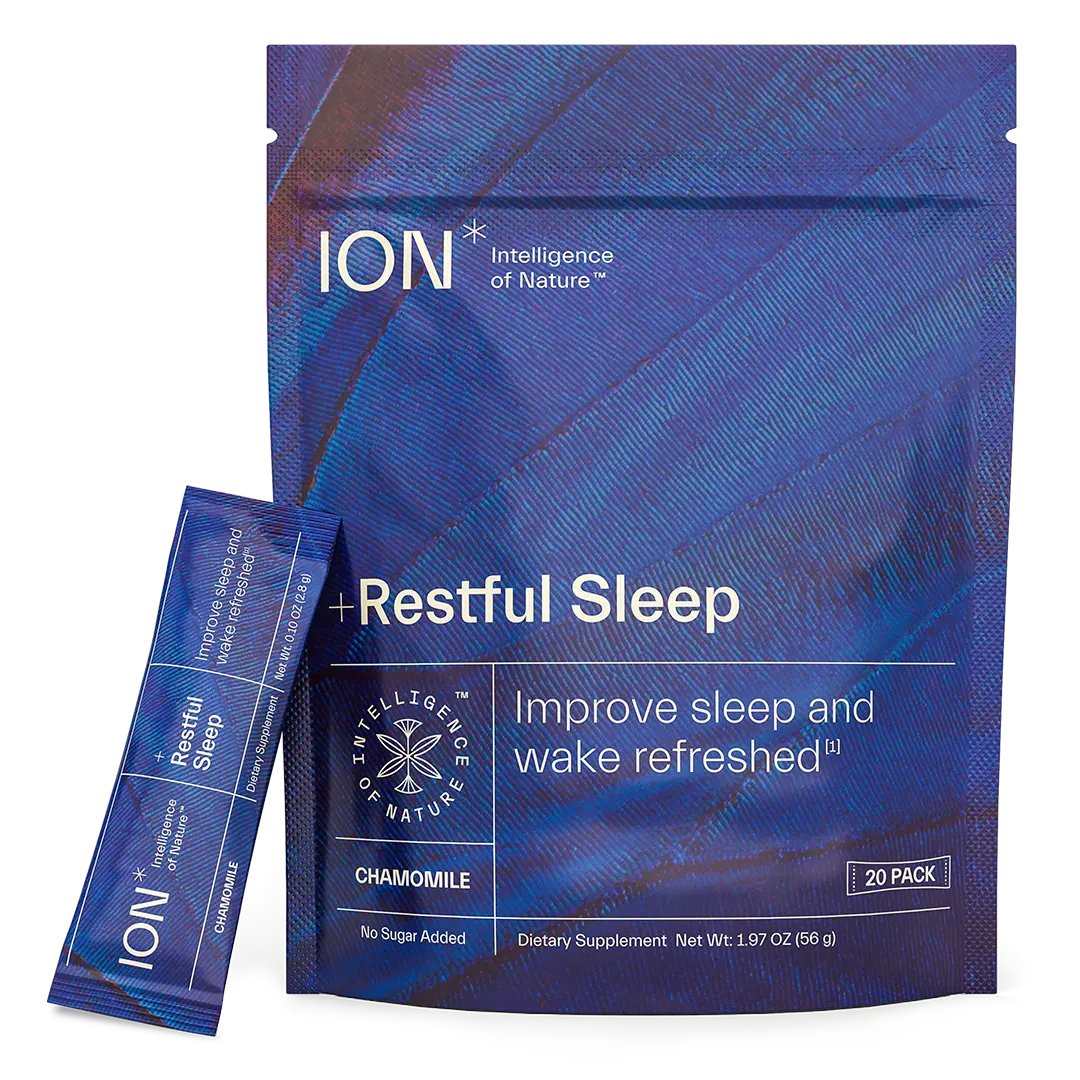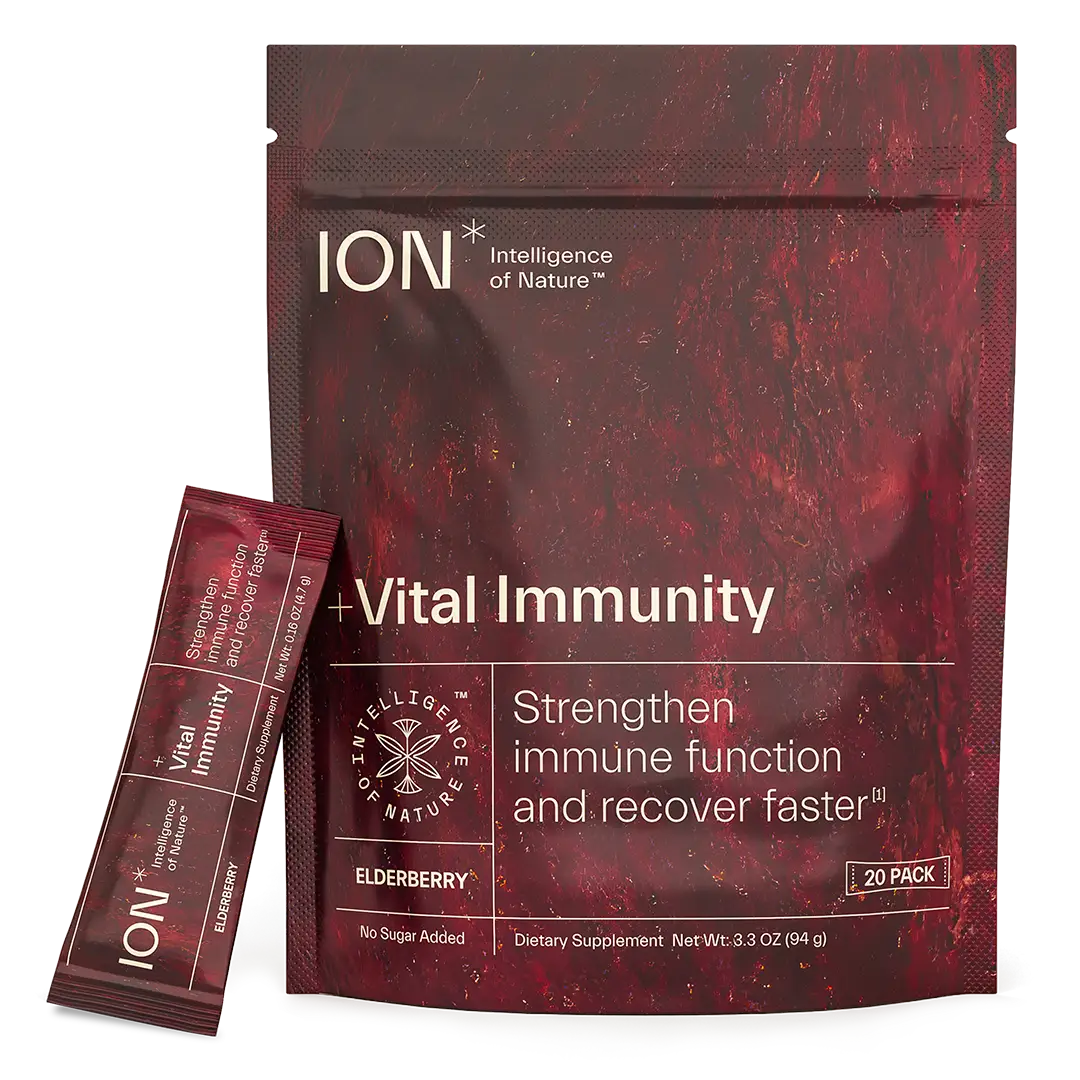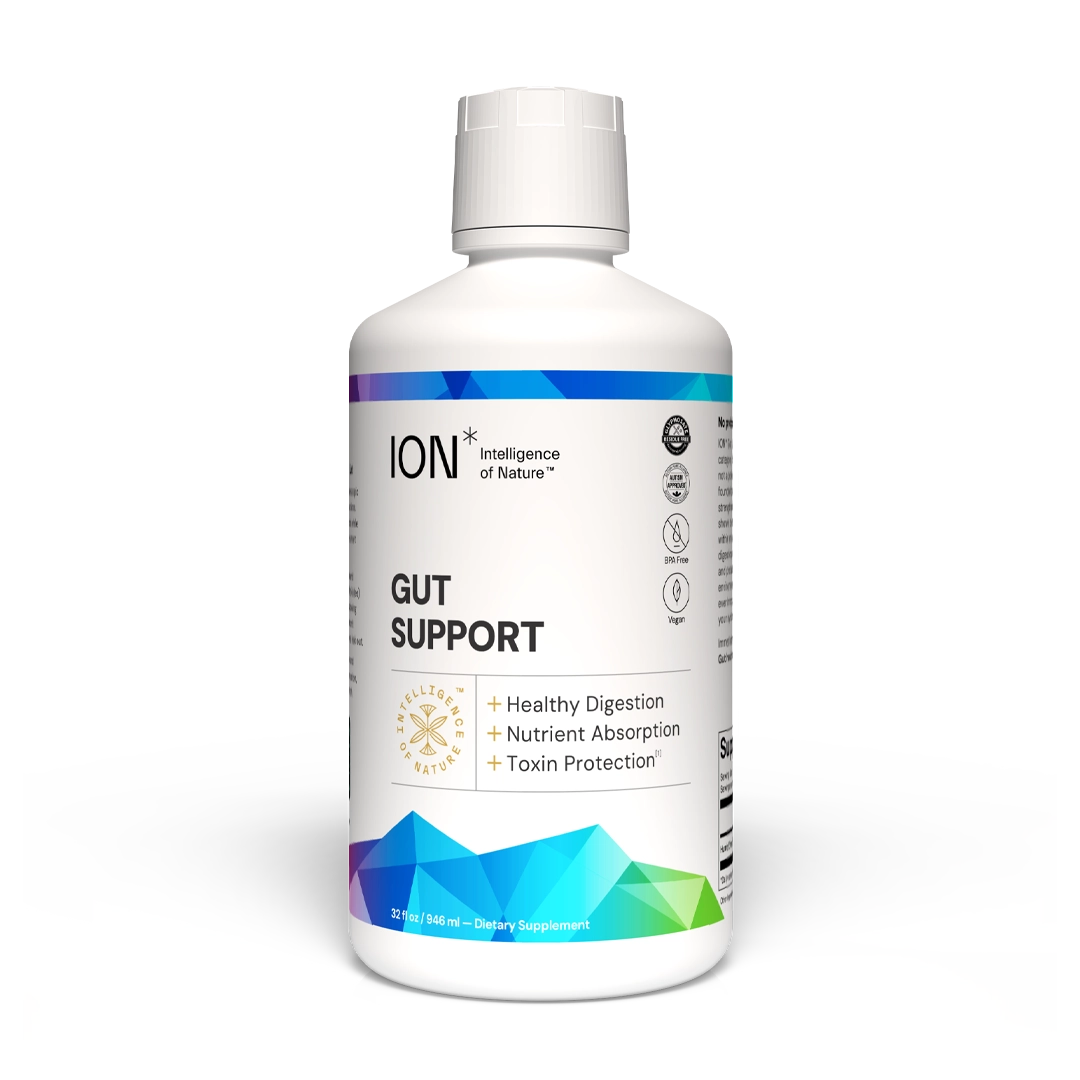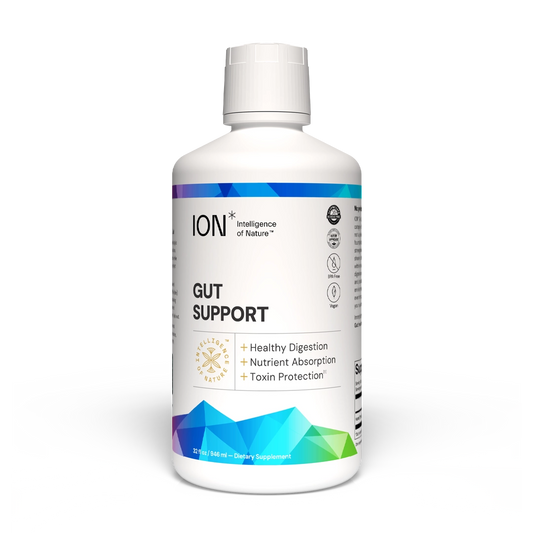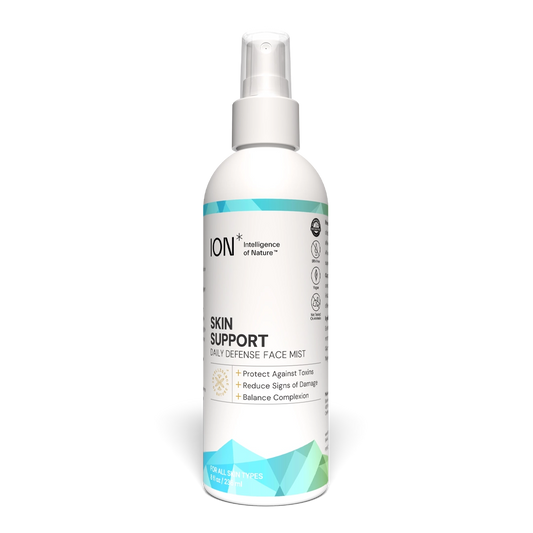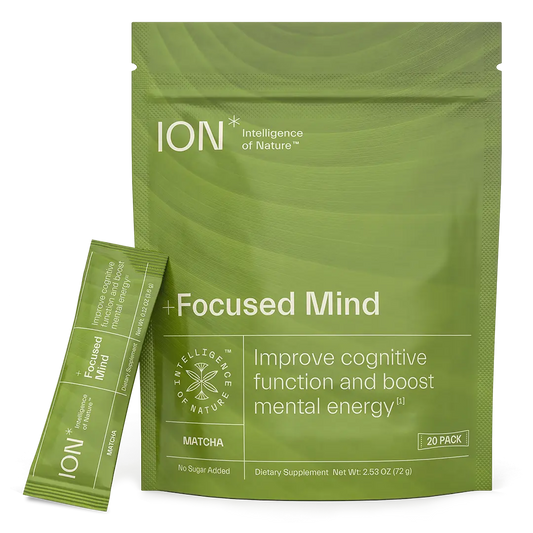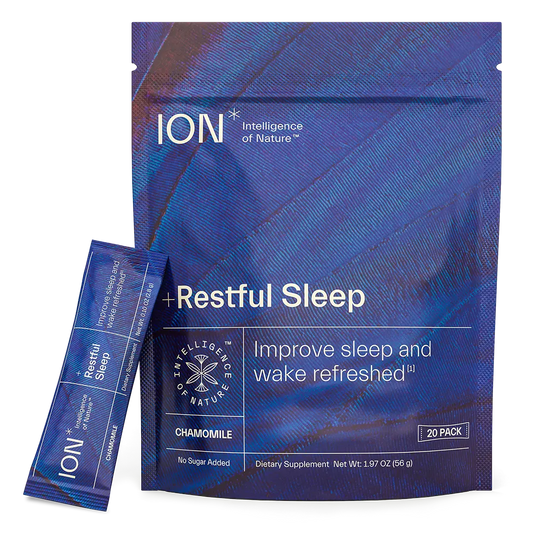We've all heard of antioxidants. They're the molecules that neutralize harmful free radicals that cause damage to our cells, which in turn, can manifest as life-threatening issues like cancer, stroke, heart disease, and other age-related diseases.
Of the thousands of antioxidants, glutathione is one of the most important and potent of them all. Glutathione is produced naturally in our bodies and is also available in certain types of foods. It’s considered so fundamentally crucial that glutathione levels are directly associated with many different aspects of health and longevity.
For most of us, the key is having enough of it, as glutathione production is more biologically prone to depletion as we get older. And beyond just age. Various factors can all play a role in weakened glutathione levels, like a poor diet, not enough exercise, a compromised immune system, chronic stress, infection, and diseases like diabetes and sleep apnea.
So, What Exactly is Glutathione?
Often referred to as the "master antioxidant," Glutathione is a naturally occurring tripeptide molecule that's composed of three amino acids: cysteine, glutamate, and glycine. This powerful molecule plays a vital role in maintaining cellular health by counteracting harmful free radicals and cleansing our bodies of various toxins.[1]
It's difficult to overstate the importance of glutathione. It's most widely known for quenching free radicals, thereby inhibiting cellular damage. But perhaps of greater importance is glutathione's ability to deal directly with the causes of oxidative stress by detoxifying common toxins like mercury, heavy metals, and other organic pollutants. [2]
In short, it's a vital neutralizer, detoxifier, and protector. And at diminished levels, you're more susceptible to neurodegenerative disorders, cardiovascular diseases, pulmonary diseases, and immune diseases, to name just a few. [2]
How Does Glutathione Work?
Given its clout in the antioxidant world, it's no wonder why glutathione has so many crucial functions. Produced in the liver from the amino acids cysteine, glutamate, and glycine, glutathione's primary roles involve detoxification and CTL activation. Without getting too deep into the weeds, the activation of CTLs (or "cytotoxic T lymphocytes") is what destroys virally infected cells, thereby playing an important role in the adaptive immune response. [3]
By killing infected cells and preventing cell damage from oxidative stress, glutathione helps to reduce inflammation and slow down the processes associated with oxidative stress. It is this very stress that eats away at cell tissue and causes DNA damage, which in turn, contributes to the progression of a whole host of diseases, like cancer, diabetes, metabolic disorders, atherosclerosis, and cardiovascular disease. [4]
With such heavy responsibility placed on glutathione in keeping us healthy, it’s often used in supplement form to maintain sufficient levels and effectively carry out its many critical functions. Glutathione supplements can be taken orally, intravenously, or intramuscularly, depending on the intended use. However, oral glutathione supplements are not as effective because the body's enzymes break it down before it can be absorbed.[5]
What is Glutathione Used For?
Because low glutathione is associated with so many chronic conditions and diseases, it's commonly used in supplement form to help restore a healthy balance. It's often used to mitigate the effects of a wide range of conditions, such as arthritis, alcohol use disorder, Alzheimer’s disease, liver diseases, lung diseases, heart disease, memory loss, Parkinson's disease, brain inflammation, and cancer. [2]
Aside from helping treat specific conditions, there are several overarching functions that glutathione supplementation supports. These functions can be boiled down into the following:
Detoxification Support
The liver works tirelessly to detoxify the body from toxins and pollutants we encounter daily. Glutathione aids in the detoxification of your body, acting as a binding agent for toxins and pollutants to be eliminated from the liver through bile or urine. More specifically, glutathione binds and detoxifies the body from metals like mercury, cadmium, arsenic, and lead. In excess, these metals can damage the central nervous system, causing all sorts of neurological disorders. [6]
Immune System Booster
A robust immune system is critical for warding off infections and staying healthy. Research has shown that adequate levels of glutathione can enhance immune function, helping you stay resilient against illness-causing pathogens. [7] In fact, one report highlighted depleted levels of glutathione associated with increased susceptibility to infections like chronic obstructive pulmonary disease, cystic fibrosis, influenza, and AIDS.[8]
DNA Synthesis and Repair
Glutathione plays a significant role in DNA synthesis by acting as a cofactor for certain enzymes responsible for creating new DNA strands during cell division. It also aids in repairing damaged DNA molecules resulting from exposure to environmental factors like radiation, chemicals, and oxidative stress. [9]
Antioxidant Balance
Glutathione is an essential antioxidant that neutralizes harmful free radicals and helps prevent cellular damage caused by oxidative stress. By doing so, it supports the body's natural defense mechanisms against various diseases and aging processes. Although supplementation is not proven to be effective, taking glutathione and consuming foods that are rich in this antioxidant can be helpful.
What are the Benefits of Glutathione?
From cognition and anti-aging to healthy skin and athletic recovery, it's no secret that glutathione has numerous health benefits that are wide-ranging in nature. While there's considerable overlap in the supportive role this antioxidant plays and the functions it carries out, some of the most profound benefits include:
Disease Prevention
As the core function and benefit of this key antioxidant, glutathione has been linked to a reduction in oxidative stress, which directly contributes to the development and progression of various diseases. Several studies have suggested that increasing glutathione levels can help reduce oxidative stress and thus prevent or slow down the progression of diseases like Alzheimer's disease, Parkinson's disease, and hepatitis.
For example, one study published by the American Chemical Society found that glutathione depletion was associated with increased oxidative stress and neurodegeneration in Alzheimer's disease.[10] Another study published by a team of Italian scientists demonstrated that glutathione depletion in the liver was linked to increased liver injury in hepatitis. [11] These findings collectively highlight the immense benefits of glutathione in preventing various types of diseases.
Improved Skin Health
Glutathione has gained attention for its potential benefits in promoting healthy skin. It's involved in several processes that contribute to skin health, such as melanin synthesis and antioxidant defense. Glutathione has been shown to lighten skin tone and reduce the appearance of hyperpigmentation, age spots, and blemishes.
Additionally, its antioxidant properties protect the skin from damage caused by UV radiation and environmental pollutants. A study published in the Journal of Cosmetic Dermatology investigated the effects of glutathione supplementation on skin complexion and reported significant improvements in skin lightening and reduction of pigmentation. [12]
Fight Autoimmune Problems
Glutathione's antioxidant and anti-inflammatory properties can help modulate the immune response and reduce the underlying inflammation associated with autoimmune diseases. While research specifically examining the effects of glutathione supplementation on autoimmune diseases is limited, studies have indicated that glutathione levels are often depleted in individuals with autoimmune conditions.
For instance, a study published in the Journal of Applied Toxicology found that patients with rheumatoid arthritis had lower levels of glutathione compared to healthy individuals. [13] By replenishing glutathione levels, it’s possible that the oxidative stress and inflammation associated with autoimmune diseases could be mitigated.
Accelerated Athletic Performance and Recovery
Glutathione's role in exercise-induced oxidative stress and inflammation makes it an interesting area of study in the realm of athletic performance and recovery. Exercise places increased demands on the body, leading to the production of free radicals and inflammation. Glutathione's antioxidant and anti-inflammatory properties help combat these effects and promote recovery.
A study published in the Journal of Applied Physiology examined the effects of oral glutathione supplementation on muscle fatigue and oxidative stress in healthy individuals. The findings suggest that glutathione resulted in increased muscle maximal voluntary contraction force and reduced muscle fatigue. [14]
Supports Neurological Health
Glutathione facilitates the removal of toxins and metabolic waste products from the brain, which not only supports cognitive performance but also reduces the risk of neurodegenerative diseases. Supporting these findings, there have been numerous studies showing glutathione impairment in the brain being linked to neurological disorders and aging. [15]
One particular study found that glutathione supplementation helped inhibit oxidative stress and inflammatory responses associated with Alzheimer's disease. In turn, there was a significant improvement in certain behavioral deficits including cognitive decline and depressive-like behavior. [16]
Detoxification and Liver Support
Glutathione is integral in the detoxification process within the body. It acts as a potent antioxidant that binds to toxins, heavy metals, and harmful chemicals alike, facilitating their elimination from the body. Similarly, glutathione also plays a critical role in liver health by supporting the liver's detoxification pathways, as the liver relies on glutathione to neutralize and eliminate toxins, such as alcohol, drugs, and environmental pollutants.
Supplementation with glutathione may help enhance liver function and promote overall detoxification. One major study investigated the effects of glutathione on liver function in patients with non-alcoholic fatty liver disease (NAFLD). The results showed that glutathione supplementation improved liver enzyme levels and reduced oxidative stress in individuals with NAFLD. [17]
Insulin Sensitivity
Glutathione has been implicated in improving the body's ability to respond to insulin and regulate blood sugar levels. When insulin sensitivity becomes impaired, it can lead to insulin resistance and contribute to the development of conditions such as type 2 diabetes. Glutathione's role in buffering oxidative stress and inflammation is shown to help improve insulin sensitivity.
A study published in the Diabetes Care journal demonstrated that glutathione levels were lower in individuals with impaired glucose tolerance and type 2 diabetes.[18] A study published in the Journal of Clinical Endocrinology and Metabolism investigated the effects of glutathione on insulin sensitivity in HIV-infected individuals, who have impaired oxidation of fatty acids. The results showed that glutathione improved insulin sensitivity and reduced markers of oxidative stress in these individuals. [19]
Anti-Aging Effects
As we age, the body's natural production of glutathione tends to decline, leading to increased oxidative stress, inflammation, and cellular damage. [20] By replenishing glutathione levels through supplementation, the body's antioxidant defenses are enhanced, which can reduce the damage inflicted on cells, including proteins, DNA, and cellular structures.
One study found that supplementing with a reduced form of glutathione had skin-lightening efficacy, suggesting that glutathione may have anti-aging effects on the skin. [21] The findings revealed that glutathione led to improved skin elasticity and reduced the appearance of wrinkles and fine lines. Parallel with glutathione's host of other benefits, these findings suggest that glutathione supplementation may have considerable anti-aging effects by mitigating oxidative stress, reducing inflammation, and protecting cells and tissues from damage.
While some people take glutathione supplements to increase their natural glutathione production and potentially benefit from its anti-aging effects, reducing toxin exposure and increasing intake of nutrient-dense foods are also excellent ways to naturally increase glutathione levels in the body.
Glutathione and Gut Health
With all that glutathione does in the body, it should come as no surprise that it also plays a crucial role in protecting your intestinal lining and maintaining overall gut health.
Glutathione is highly abundant in the mucosal cells of the gastrointestinal tract. These cells, which make up the tract's mucosal lining, are essential for gut barrier function. [22] This protective barrier ensures that harmful substances don't leak into your bloodstream while allowing essential nutrients to pass through. When there's an imbalance or deficiency of glutathione, it can lead to inflammation and increased permeability (aka "leaky gut"). Not only does this cause discomfort but also paves the way for various diseases.
Fighting Oxidative Stress with Glutathione
Oxidative stress is a major factor contributing to poor gut health. It occurs when there's an excess production of free radicals which can damage cells and tissues within the body – including those found in our digestive system.
Inadequate levels of glutathione, which is responsible for neutralizing these pesky free radicals, can exacerbate the effects of oxidative stress, thereby wreaking havoc on our gut. The solution? You guessed it: optimizing glutathione levels to fight off free radicals and the subsequent oxidative stress that they cause.
Glutathione and Gut Microbiome Diversity
It may seem obvious to some, but it's worth mentioning that a diverse gut microbiome is essential for optimal health. This is characterized by the bacteria and microbes comprising our gut's ecosystem. But less obvious is the fact that glutathione also has a crucial role in maintaining this microbiome diversity as well. [23]
Research suggests that glutathione can help modulate the composition of our gut bacteria, promoting the growth of beneficial microbes while keeping harmful ones at bay. In other words, a diverse and well-balanced microbiome translates to better digestion, immunity, and overall well-being.
In essence, glutathione's impact on gut health goes beyond just being an antioxidant; it's also vital for maintaining intestinal integrity and fostering a healthy microbial balance. And because gut health is so reliant on glutathione, and vice versa, it provides an avenue to maintain optimal levels of this vital antioxidant.
What Foods are High in Glutathione?
Nutrition is an important mechanism to help ensure the healthy production of glutathione. But it's important to note that dietary glutathione through specific foods is not easily available due to digestive enzymes breaking it down into amino acids. [23]
Rather, it’s important to look at the complete nutritional picture of glutathione production versus only eating certain foods high in the antioxidant. This more holistic picture includes:
- Greens: Despite having low bioavailability, certain plant-based foods are naturally high in glutathione. These include asparagus, avocado, broccoli, Brussels sprouts, cucumber, green beans, kale, okra, and spinach.
- Vitamin C: This is another potent antioxidant that's crucial for maintaining glutathione levels. It also works by attacking free radicals, thereby sparing glutathione. Foods rich in vitamin C include citrus fruits, kiwis, strawberries, papayas, and bell peppers.
- Sulfur-Rich Foods: Sulfur is a key element found in the amino acids required for glutathione production. Allium vegetables like garlic, shallots, and onions are rich in sulfur compounds. Cruciferous vegetables like broccoli, Brussels sprouts, cauliflower, cabbage, kale, and bok choy contain sulforaphane, a compound known to enhance glutathione levels.
- Selenium: Selenium acts as a cofactor for glutathione peroxidase, an antioxidant enzyme that protects cells from damage caused by free radicals. Brazil nuts are an excellent source of selenium, with just one nut providing a day's worth. Other selenium-rich foods include legumes, sunflower seeds, brown rice, mushrooms, fish, oatmeal, and spinach.
- Protein: While the amino acids cysteine, glutamic acid, and glycine – those required for glutathione synthesis - are naturally produced by the body – they become conditionally essential during times of stress or illness. Whole grains, kombu, lentils, sunflower seeds, organic tofu, and tempeh are good sources of these amino acids.
- Herbs: The liver, which is the primary organ responsible for glutathione production, thrives on silymarin, an antioxidant compound known for its liver-protective properties. Milk thistle is an herb that's rich in silymarin and recommended to support glutathione levels. Curcumin, which is found in turmeric spice, has been shown to induce glutathione biosynthesis within cells. [24]
Glutathione-rich foods are only part of the larger equation in helping maintain optimal levels of this crucial antioxidant. Taking a systems approach with nutrition, exercise, stress management, and sleep is essential to improve glutathione levels.
Glutathione at a Glance: Common FAQs
There are a lot of frequently asked questions about glutathione and the mighty role it plays. Summarized below are responses to these common FAQs:
What Does Glutathione Do for the Body?
Glutathione is an important antioxidant that's produced by the liver and found in every cell in the body. Comprised of the three amino acids glutamine, glycine, and cysteine, glutathione helps protect the body from damage to cells caused by free radicals, peroxides, and heavy metals. It's essential for proper immune system functioning and supports a number of other health benefits:
- Protecting the body from disease
- Slowing cancer progression
- Improving insulin sensitivity
- Reducing symptoms of autoimmune diseases
- Reducing the impact of diabetes
- Supporting immune function
- Breaking down some free radicals
- Helping certain enzymes function
Parallel with these benefits, glutathione eliminates toxins from our bodies and enables us to ward off a host of diseases and conditions, such as Type 2 diabetes, hepatitis, and Parkinson’s disease.
What are the side effects of glutathione?
The adverse effects of supplementing with glutathione depend on the individual and the type taken. Some people who take an inhaled form of glutathione may experience bronchospasm, or contractions of the bronchial tubes, causing wheezing, coughing, and difficulty breathing.
There is also some concern that using glutathione supplements may cause cramping and bloating or allergic reactions, with mild symptoms like a rash or hives occurring. While these side effects are not common, it's advised to stop taking the supplement and consult your doctor if they do arise.
What happens when your body is low on glutathione?
Low glutathione levels are generally characterized by a myriad of lifestyle factors, including stress and mental health, diet and gut health, and exercise and physical health.
A deficiency of glutathione leads to increased oxidative stress, which greatly reduces the body's ability to detoxify the accumulation of pollutants and heavy metals. This also inhibits the repair of DNA while contributing to cell mutations and weakened cell membranes, which can all evolve into a wide range of health problems.
When your body is low in glutathione, some of the most common signs of deficiency include fatigue, muscle weakness, and difficulty exercising or executing common motor functions. Low glutathione levels can also manifest in the skin, causing it to become dry and flaky.
Products like ION* Gut Support can help aid in restoring the body's ability to improve nutrient absorption, defend from toxins, and diversify your microbiome. More than just a gut health supplement, ION* brings your body back to nature, supporting its natural functions that are critical in glutathione production.
Scientific References
- https://pubs.rsc.org/en/content/articlehtml/2015/ra/c4ra13315c
- https://www.ncbi.nlm.nih.gov/pmc/articles/PMC4684116/
- https://www.sciencedirect.com/topics/medicine-and-dentistry/cytotoxic-t-cell
- https://www.ncbi.nlm.nih.gov/pmc/articles/PMC5551541/
- https://www.ncbi.nlm.nih.gov/pmc/articles/PMC3162377/
- https://www.ncbi.nlm.nih.gov/pmc/articles/PMC5634692/
- https://pubmed.ncbi.nlm.nih.gov/11115795/
- https://www.ncbi.nlm.nih.gov/pmc/articles/PMC3048347/
- https://www.ncbi.nlm.nih.gov/pmc/articles/PMC2704241/
- https://pubs.acs.org/doi/10.1021/acsomega.2c02760
- https://www.mdpi.com/2076-3921/10/3/364
- https://onlinelibrary.wiley.com/doi/10.1111/jocd.12910
- https://analyticalsciencejournals.onlinelibrary.wiley.com/doi/10.1002/jat.736
- https://www.semanticscholar.org/paper/Glutathione-supplementation-suppresses-muscle-by-Aoi-Ogaya/001996b6d6eb71a10868bf2f32b1b54e8ab9f68e
- https://www.mdpi.com/1422-0067/22/9/5010
- https://pubmed.ncbi.nlm.nih.gov/32297027/
- https://www.ncbi.nlm.nih.gov/pmc/articles/PMC5549431/
- https://www.ncbi.nlm.nih.gov/pmc/articles/PMC3005481/
- https://www.ncbi.nlm.nih.gov/pmc/articles/PMC3879663/
- https://pubmed.ncbi.nlm.nih.gov/26467067/
- https://pubmed.ncbi.nlm.nih.gov/28490897/
- https://pubmed.ncbi.nlm.nih.gov/10470601/
- https://www.ncbi.nlm.nih.gov/pmc/articles/PMC6770193/
- https://pubmed.ncbi.nlm.nih.gov/15650394/
